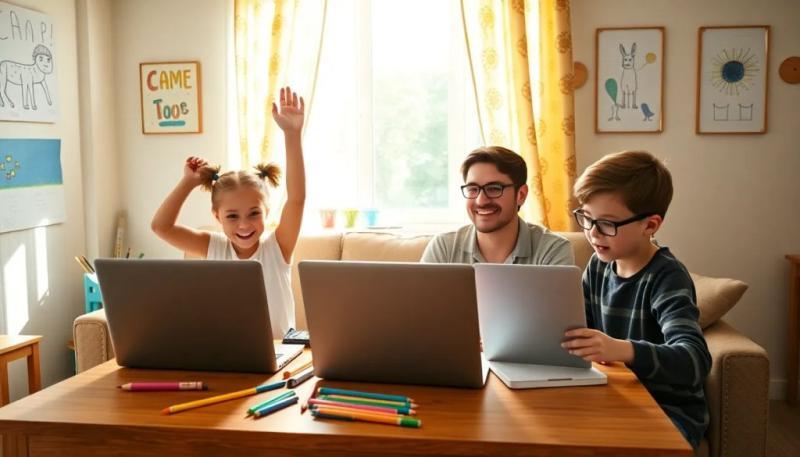As parents navigate the complexities of remote schooling, the role of babysitters has emerged as a vital support system. By offering tailored assistance and guidance, babysitters can ease the burden on families striving to balance work and education.
Understanding how babysitters can effectively contribute to remote learning is essential for parents seeking to create a productive educational environment for their children.
How nannies and parents can collaborate for effective learning?
Collaboration between nannies and parents is crucial to establish a cohesive education plan for children learning remotely. Regular meetings and updates ensure that both parties are aligned on educational goals and schedules.
Clear communication is key to fostering an effective learning environment. Parents should outline their expectations regarding homework, screen time, and educational resources, allowing nannies to reinforce these structures throughout the day.
- Establish daily routines that include dedicated learning hours.
- Share educational resources and tools that can enhance learning.
- Set aside time for regular feedback sessions to discuss the child’s progress.
This collaborative approach not only helps children stay on track but also strengthens the relationship between caregivers and parents, ultimately benefiting the child’s educational experience.
What are the benefits of hiring a babysitter during remote schooling?
Hiring a babysitter during remote schooling offers numerous benefits for families juggling work and educational responsibilities. One primary advantage is the personalized attention that babysitters can provide to children, helping them engage with their studies more effectively.
Babysitters can help maintain a structured environment that enhances focus and productivity. By overseeing daily routines, they ensure that children participate in virtual classes, complete assignments, and take breaks when necessary.
- They provide individualized support tailored to the child’s learning style.
- They can assist with technology-related challenges during virtual classes.
- Babysitters can facilitate social interactions through organized playdates or group activities.
In addition, having a babysitter can alleviate stress for parents, allowing them to concentrate on their work responsibilities without constant interruptions.
How can babysitters enhance children’s educational experience?
Babysitters have the potential to significantly enhance the educational experience of children by integrating creative and engaging learning methods. They can incorporate fun activities that reinforce the curriculum while keeping children motivated.
Interactive learning techniques, such as games, storytelling, and hands-on projects, can make subjects more relatable and interesting for children. This approach not only aids in comprehension but also fosters a love for learning.
- Supplementing online lessons with educational games.
- Encouraging reading by establishing a reading corner at home.
- Incorporating arts and crafts that connect to academic subjects.
Through these strategies, babysitters can create a dynamic learning atmosphere that stimulates curiosity and critical thinking in children.
What strategies can babysitters use to assist with homework?
To assist children effectively with homework, babysitters can implement several strategies that foster independence and accountability. Understanding the specific challenges each child faces is crucial in providing the right support.
One effective strategy is to break down assignments into manageable tasks, allowing children to focus on one segment at a time. This can reduce feelings of overwhelm and help them build confidence in their abilities.
- Encourage children to ask questions and express their difficulties.
- Use visual aids and resources to clarify complex concepts.
- Set achievable goals for each homework session to track progress.
By fostering a supportive and patient environment, babysitters can empower children to take ownership of their educational journey.
How do parents communicate needs to babysitters effectively?
Effective communication between parents and babysitters is essential to ensure that children's educational and emotional needs are met. Parents should approach this dialogue with clarity and openness, establishing a foundation for collaboration.
One effective method is to create a comprehensive list of expectations and responsibilities for the babysitter. This can include daily routines, academic goals, and any specific challenges the child may face.
- Schedule regular check-ins to discuss the child’s progress and any issues arising.
- Provide feedback on the babysitter’s approach and effectiveness.
- Foster an open-door policy where caregivers feel comfortable sharing insights.
By maintaining an ongoing dialogue, both parties can work together to create a positive and enriching learning experience for children.
Why are pandemic schooling pods important for education?
Pandemic schooling pods have gained popularity as an effective solution for families seeking to enhance their children’s education during challenging times. These small groups allow children to learn collaboratively while providing social interaction that is often lacking in remote learning environments.
By pooling resources, families can hire qualified educators or tutors to facilitate lessons, ensuring that children receive a high-quality educational experience. This model not only supports academic growth but also addresses social and emotional needs.
- Students benefit from shared knowledge and different perspectives.
- Pods create a supportive community for families navigating remote learning.
- They can help mitigate feelings of isolation by connecting children with peers.
In essence, pandemic schooling pods offer a comprehensive approach to education that addresses both academic and social dimensions during remote schooling.
What qualifications should you look for in a babysitter?
When hiring a babysitter to support remote schooling, it is vital to consider specific qualifications that align with educational needs. Look for candidates who possess relevant experience, particularly with children of similar ages.
Additionally, it is beneficial if babysitters have a background in education or tutoring, as they can bring valuable skills and strategies to support learning effectively. First aid and CPR certification are also important qualifications to ensure the safety of children in their care.
- Experience with remote learning technologies and platforms.
- Strong communication and interpersonal skills.
- A creative approach to engage children during lessons.
Ultimately, selecting a babysitter with the right qualifications can significantly enhance the educational experience for children during remote schooling.
Frequently asked questions about babysitting and remote schooling
Questions related to how babysitters can contribute to remote education
What is a remote babysitter?
A remote babysitter is a caregiver who provides supervision and support to children engaged in online learning from home. They assist with managing schedules, facilitating lessons, and ensuring a structured environment conducive to learning.
These babysitters often work closely with parents to establish routines and reinforce educational objectives, playing a crucial role in supporting children’s academic growth during remote schooling.
What education does a babysitter need?
While formal education requirements for babysitters vary, it is beneficial for candidates to have a background in child development or education. Many babysitters pursue additional training or certification in areas such as first aid, CPR, and effective communication strategies.
Moreover, experience working with children, particularly in educational settings, can enhance a babysitter’s ability to support children during remote learning.
What is a digital babysitter?
A digital babysitter is a caregiver who helps children navigate online learning environments. This role often includes assisting with technology setup, troubleshooting issues, and keeping children engaged during virtual classes.
Digital babysitters also play a pivotal role in managing the child’s screen time and ensuring they remain focused on their educational tasks while offering support when needed.
What is the number one rule of babysitting?
The number one rule of babysitting is to ensure the safety and well-being of the child in their care. This involves vigilant supervision, establishing clear boundaries, and creating a safe environment for children to learn and play.
Babysitters must also maintain open lines of communication with parents, keeping them informed about any issues or concerns that arise during their time with the child.
Para entender mejor este tema, te invitamos a ver el siguiente video que explora cómo los cuidadores apoyan el aprendizaje remoto de los niños.




